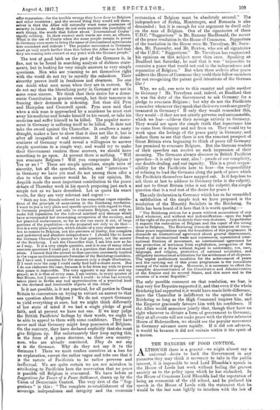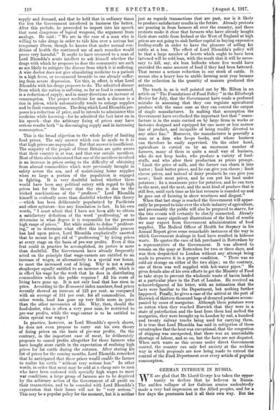THE DANGERS OF FOOD CONTROL
ALTHOUGH there is a general—we might almost say a universal—desire to back the Government in any measures they may think it necessary to take in the public/ interest, it is impossible to read Lord Rhondda's speech in the House of Lords last week without feeling the gravest anxiety as to the policy upon which be has embarked. III the House of Commons Lord Rhondda had the reputation of being an economist of the old school, and he prefaced his speech in the House of Lords with the statement that he would be the last man lightly to interfere with the law of
supply and demand, and that he held that in ordinary times the less the Government interfered in business the better. After this prelude, he proceeded to import into his speech that most dangerous of logical weapons, the argument from analogy. He said : "We are in the case of a man who is willing to take drugs in order to tide him over a serious but temporary illness, though he knows that under normal con- ditions of health the continued use of such remedies would prove very harmful." It ought to have occurred to a man of Lord Rhondda's acute intellect to ask himself whether the drugs with which he proposes to dose the community are such as are likely to mitigate the disease from which it is suffering. A wise doctor does not give stimulating medicine to a patient in a high fever, or recommend bromide to one already suffer- ing from severe depression. Yet this, in effect, is what Lord Rhondda with his drugs proposes to do. The admitted disease from which the nation is suffering, so far as food is concerned, is a reduction of supply, and in many directions an increase of consumption. The proper medicine for such a disease is a rise in prices, which automatically tends to enlarge supplies and to limit consumption. The drug which Lord Rhondda pro- poses is a reduction of price, and he intends to administer this medicine while knowing—for he admitted the fact later on in his speech— that the arbitrary fixing of prices may have serious results both "in discouraging supply and in increasing consumption."
This is the broad objection to the whole policy of limiting food prices. The only answer which can be made to it is that high prices are unpopular. But that answer is insufficient. The majority of the people of Great Britain are quite aware that their country is at war, and that war entails sacrifices. Most of them also understand that one of the sacrifices involved is an increase in prices owing to the difficulty of obtaining from abroad commodities which were previously brought in safety across the sea, and of maintaining home supplies when so large a portion of the population is engaged in fighting. It is very doubtful indeed whether there would have been any political outcry with regard to high prices but for the theory that the rise is due to the wicked machinations of the "profiteer." Lord Rhondda himself is evidently more than doubtful whether this theory —which has been deliberately popularized by Pacificists and other agitators—has any foundation in fact. In his own words, "I must admit that I have not been able to obtain a satisfactory definition of the word profiteering,' or to determine in what degree it is responsible for the present high range of prices." But while unable to define " profiteer- ing," or to determine what effect this indefinable process has had upon prices, Lord Rhondda emphatically asserted that he meant to get rid of " profiteering " by fixing prices at every stage on the basis of pre-war profits. Even if this feat could in practice be accomplished, its justice is more than doubtful. The Government have already frequently acted on the principle that wage-earners are entitled to an increase of wages, or alternatively to a special war bonus, to meet the increased cost of living. Why is not a small shopkeeper equally entitled to an increase of profit, which is in effect his wage for the work that he does in distributing commodities which the public requires ? All his costs of living have gone up. It is not only food that has risen in price. According to the Economist index numbers, food prices recently showed an increase of 123 per cent, as compared with an average of 114 per cent, for all commodities. In other words, food has gone up very little more in price than the other necessaries of life. Why, then, should the food-dealer, who is often a very poor man, be restricted to pre-war profits, while the wage-earner is to be entitled to claim special war wages ?
In practice, however, as Lord Rhondda's speech shows, he does not even propose to carry out his own theory of fixing prices on the basis of pre-war profits. On the contrary, in the important case of meat, lie deliberately proposes to cancel -profits altogether for those farmers who have bought store cattle in the expectation of realizing high prices for fat cattle during the autumn. After stating his list of prices for the coming months, Lord Rhondda remarked that he anticipated that these prices would enable the farmer to realize his cattle " without very serious loss." In other words, in order that meat may be sold at a cheap rate to men who have been endowed with specially high wages to meet war conditions, a large group of farmers are to be deprived by the arbitrary action of the Government of all profit on their transactions, and to be consoled with Lord Rhondda's expectation that their losses will not be " very serious." This may be a popular policy for the moment, but it is neither
just as regards transactions that are past, nor is it likely to produce satisfactory results in the future. Already protests are pouring in from farmers all over the country, and these protests make it clear that farmers who have already bought their store cattle from Ireland or the West of England at high prices are not going to sink further capital in buying expensive feeding-stuffs in order to have the pleasure of selling fat cattle at a loss. The effect of Lord Rhondda's policy will be that a large number of beavats which ought to have been fattened will be sold lean, with the result that it will be neces- sary to kill, say, six lean bullocks where five would have provided the same amount of food if they had been fattened. That means a serious reduction in our stock of cattle. It means also a heavy loss to arable farming next year because of the reduction in the quantity of manure produced this autumn.
The truth is, as is well pointed out by Mr. Hilton in an article on " The Foundations of Food Policy "in the Edinburgh Review for July, that the Government have made a profound mistake in assuming that they can regulate agricultural produce with the same ease as they Call control the output of staple manufactures. In making that assumption the Government have overlooked the important fact that" manu- facture is in the main carried on by large firms in works or factories designed and equipped for one more or less narrow line of product, and incapable of being readily diverted to any other line." Moreover, the manufacturer is generally a man or a firm who keeps books, and whose business can therefore be easily supervised. On the other hand, agricultare is carried on by an enormous number of farmers, many of them in quite a small way of business, who do not keep books, who produce a variety of food- stuffs, and who alter their production as prices prompt. "Limit the price of milk, and the farmer can churn it into butter ; limit butter prices, and he can give you cheese ; limit cheese prices, and instead of dairy products he can give you meat ; limit meat prices, and he can put his land under potatoes ; fix a maximum price for potatoes, and he can turn to the next, and the next, and the next kind of produce that is still free, until such time as his last recourse is rounded up and he goes out of farming in sheer weariness and disgust.' When that last stage is reached the Government will appar- ently be prepared to take over the whole industry of agriculture, and presumably the public will also be prepared to starve, for the two events will certainly be closaly connected. Already there are many significant illustrations of the kind of results we may expect from Government administration of food supplies. The Medical Officer of Health for Stepney in his Annual Report gives some remarkable instances of the way in which Government dealings in food have resulted in hideous waste. He quotes the case of fish purchased in Rotterdam by a representative of the Government- It was allowed to remain on the quay at Rotterdam for two or three days, and was then despatched to London without any attempt being made to preserve it in a proper condition. " There was no cold-air storage on either of the two ships ; on the contrary, one of them was well supplied with hot-water pipes." He gives details also of his own efforts to get the Ministry of Food to take steps to prevent the wholesale waste of bacon landed at a particular place in the Port of London. He received an acknowledgment of his letter, with an intimation that the facts were familiar to the Department, but nothing further happened. Finally, he gives a case of the arrival at the port of Harwich of thirteen thousand bags of deoayed potatoes accom- panied by cases of margarine. Although these potatoes were so rotten when they reached Harwich that they were in a state of putrefaction and the heat from them had melted the margarine, they were brought up to London by rail, a hundred and twenty railway trucks being used for carrying them. It is true that Lord Rhondda has said in mitigation of these catastrophes that the heat was exceptional, that the congestion of shipping was unexpected, that there was an unavoidable shortage of labour, and so on, but the facts are not disputed. When such waste as this occurs under direct Government control, the country can only feel anxiety at the reckless way in which proposals are now being made to extend the control of the Food Department over every article of popular consumption.



























 Previous page
Previous page